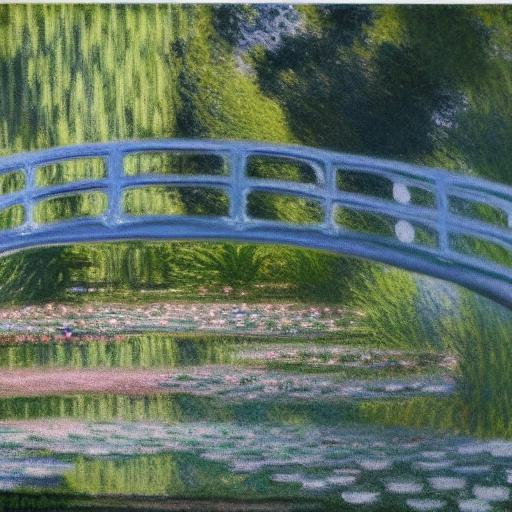How to write this prompt?
Here is a detailed explanation of the prompt:
- “A gloomy painting”: The word “gloomy” sets the overall mood of the painting. It suggests that the image should have a dark and somber tone.
- “Of a woman standing next to a pond”: This sets the scene for the painting and gives the AI a clear focus for the subject of the image. The woman should be the central figure in the painting, and her presence next to the pond should be emphasized.
- “That is filled with water lilies, flowers, and willow trees”: This provides additional context for the painting, including the type of flora that should be present. The AI should include water lilies, flowers, and willow trees in the image.
- “An impressionist painting by Claude Monet”: This is a reference to the style of the painting. The AI should generate an impressionist-style image, similar to the work of Claude Monet.
- “Flickr”: This is a reference to the source of the image. The AI could potentially use images from Flickr as reference material for generating the painting.
Overall, the prompt provides clear instructions for the AI to create a gloomy impressionist-style painting of a woman standing next to a pond filled with water lilies, flowers, and willow trees.
What is the significance of water lilies in Claude Monet’s paintings?
Water lilies were a recurring motif in Claude Monet’s paintings, particularly in his later years. He was inspired by the water garden he created at his home in Giverny, France, and often painted the lilies in varying shades of pink, purple, and white. For Monet, the water lilies represented a sense of peace and tranquility, and he often used them to convey a sense of calm in his paintings.
How to paint a gloomy impressionist-style painting?
To paint a gloomy impressionist-style painting, you could start by using a dark, muted color palette. Choose colors like gray, brown, and deep blue to create a somber mood. Use loose brushstrokes and impasto techniques to create texture and depth in the painting. You could also experiment with lighting and shadows to create a sense of darkness and moodiness in the painting.
Who were some other famous impressionist painters besides Claude Monet?
Some other famous impressionist painters include Pierre-Auguste Renoir, Edgar Degas, and Mary Cassatt. These artists were part of a larger movement that sought to capture the fleeting, ephemeral nature of light and atmosphere in their paintings. They often used loose brushwork, bright colors, and plein air techniques to capture the essence of their subjects.
Do I need to have technical knowledge or programming skills to use AI art generation prompts?
The answer to this question depends on the specific AI art generation tool you are using. Some AI art generation tools may require technical knowledge or programming skills to use, while others may be designed for use by people with little to no technical background.
Generally, most AI art generation tools have a user-friendly interface that allows users to input prompts and generate images with just a few clicks. However, some tools may require a basic understanding of programming languages like Python, or may require users to set up and configure the tool themselves.
If you are interested in using AI art generation tools but do not have a technical background, it may be helpful to start with a user-friendly tool and work your way up to more advanced tools as you gain experience.
Are there any copyright issues with using AI-generated art?
The answer to this question is somewhat complicated, as it depends on a number of factors, including the specific AI art generation tool being used and the source material used to train the AI model.
In general, copyright law applies to AI-generated art in much the same way it applies to any other form of creative work. If the AI-generated art is based on copyrighted material, such as a photograph or a painting, there may be copyright issues involved.
Additionally, if the AI-generated art is being used for commercial purposes, such as in advertising or marketing materials, there may be additional legal considerations to take into account.
It is important to note that the legality of using AI-generated art can be complex, and it is always a good idea to consult with a legal professional before using AI-generated art in any commercial or public-facing context.
Visual Paradigm Online is a powerful design tool that enables users to seamlessly integrate AI-generated art into their graphic designs, resulting in visually stunning and engaging graphics with just a few clicks. With its user-friendly interface and an extensive collection of design templates and assets, Visual Paradigm Online offers a convenient and effortless way to experiment with various styles and layouts until you achieve the perfect combination for your project.


